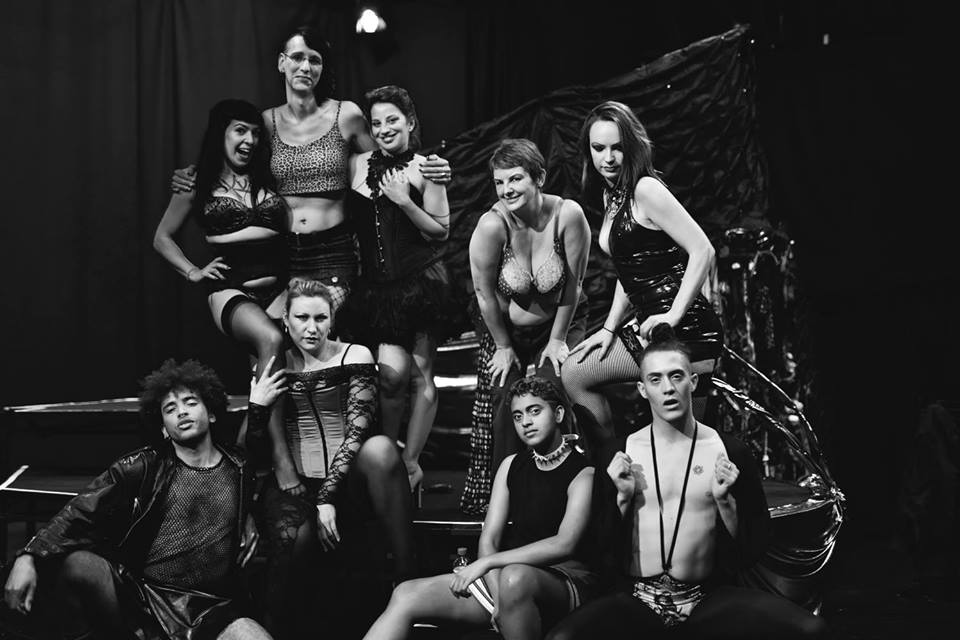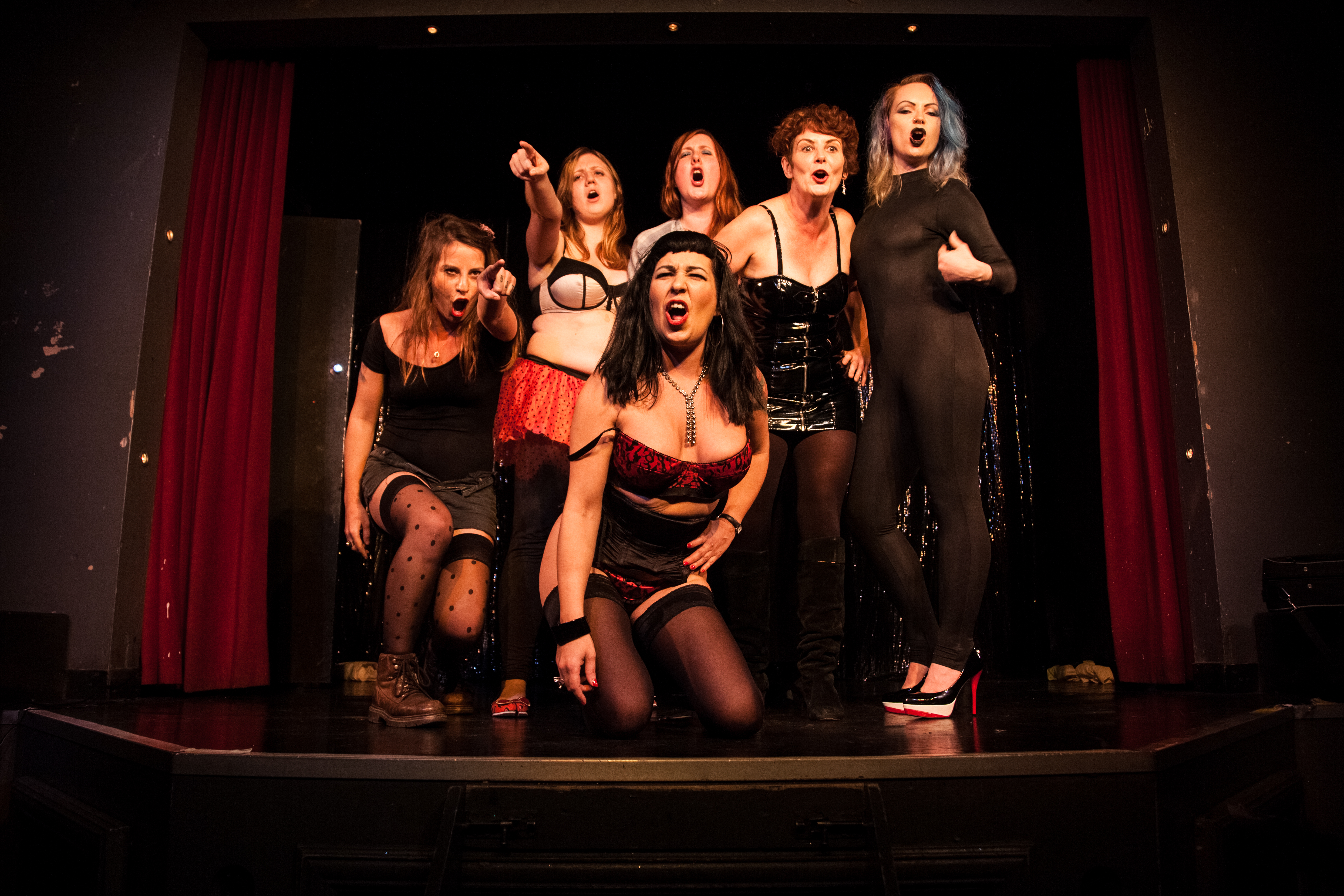ELLA WILSON reviews the Sex Workers’ Opera at Ovalhouse.
Following its UK tour, Experimental Theatre’s unabashedly lewd, funny, and honest Sex Workers’ Opera comes to the Ovalhouse theatre, prepared to force generalised assumptions and heteronormative classifications into submission. The intention behind the piece is clear from the Ringmaster’s introduction: ‘Ladies, gentlemen, and those of you clever enough to have moved past such heteronormative binaries.’ Created and performed by a cast made up of 50% experienced sex-workers, the play presents a diverse range of incredibly different stories from real sex-workers, all of which have a powerful ring of truth. The show delivers on its promise to offer a wide range of opinions on and experiences of the modern sex industry, and rather than offering any one solution, their conclusion is this: the best we can do is allow people to tell their stories, and listen to them. As the chorus sings in the opera’s opening number: ‘Have you come to judge, or have you come to relate?’ We have come to listen; we have come to laugh. There’s even a cello wearing a strap-on.

The script joyously makes fun of third-wave feminists and activists who push their assumptions on sex-workers. Simone’s sister, an audience plant, interrupts the first number by yelling self-righteously about how these women are being exploited: ‘We need to save them! They need help!’. Her well-meaning but misguided and immoveable opinions on her sister’s sex work are a continuing point of tension between the two. In one of the more successful comedic sequences, the cast play ‘Boring Bingo’, otherwise known as ‘bullshit sex-workers hear all the time’. And in a particularly effective song, two warring protest factions hold banners, reading ‘DON’T SELL YOUR BODIES’, and ‘RIGHTS IS NOT RESCUE – OUR CHOICE’. This is a simple and visually striking way to exemplify the complicated issues which define sex work in the 21st century, and is arguably the show’s best musical number. The opposing groups eventually echoing each other, both repeating ‘Power to the women’, demonstrating that their intentions and beliefs are simultaneously the same and wildly different.
Unafraid to get political, of course, the show tackles subjects including the problems with the Nordic model, recent online porn legislation in the UK, and advocates decriminalisation by citing the example of New Zealand’s 2003 Prostitution Reform Act. They tell the audience that 17th December is the International Day to End Violence Against Sex Workers, and we take part in a minute’s silence, a stark reminder of the horrifying injustice sex-workers, particularly trans sex-workers of colour, regularly face. But most emotionally affecting are the personal stories, simply told. In a moment that brought me almost to tears, the actors step forward into a spotlight one by one and talk freely, in a way that feels almost unscripted. One discusses why she specialises in seeing clients with disabilities and sees care-giving as a ‘radical act’; another speaks of social services almost taking her daughter away; someone gives a meditative and intelligent explanation of what will happen to them if the Nordic model is implemented. The change in tone is stark compared to the high performativity of the bulk of the show, which drags at times. It is in moments like this when the piece is most successful. This is just real people telling their stories, and asking us to hear them.

At times the play lacks structure: the abrupt tonal and stylistic shifts between stories are jarring at times, and feel lacking in thought. Certain segments work better than others, and some judicious cutting is perhaps in order; many sections run too long and jokes which are solid, and should land, become a case of diminishing returns. Although the decision to have a range of stories and resist coming to a set conclusion is brilliant, the seemingly arbitrary placement of individual stories made emotional investment difficult to sustain.
The play is strongest when it is simple; the music is strongest when the voices join in chorus. The band is incredibly skilled, and many of the actors give outstanding vocal performances. But just as the characters, and the real sex-workers and friends who play them, are stronger and safer when they work as a community, their voices are boldest together. In the second act, the cast comes into the audience, finding one person each and telling them their individual story. The muttering builds until it is a cacophony of stories, a microcosm of the play itself. The first time this happens, the scene is broken by a violent, jarring police raid: the bubble of kindness and solidarity is burst.
But because finding solidarity in storytelling is the message here, the scene returns at the play’s close. In this return to what earlier was cruelly cut short, the play acts as an emotional testament to the power of storytelling to affect individuals: it is a powerfully optimistic dramatic statement . One actor even got so carried away by the interaction she was having that she almost missed her cue. The cast bring the audience members they have been speaking to up onto the stage, and they make their final unified declaration, over elegiac violin: ‘I am loved, lonely, and in-between. I am so many things you cannot see. Listen to me.’ They all hold hands, they hug strangers, they kiss strangers. And we, the strangers, listen.
Sex Workers’ Opera is running until December 2nd. Find tickets and more information here.
Featured image courtesy of www.ovalhouse.com.





